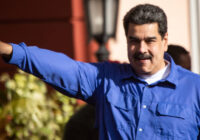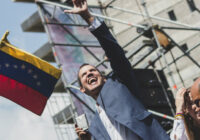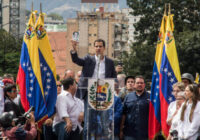The desire for change has rarely been this strong in Venezuela.
On January 10, Nicolás Maduro staged a swearing-in ceremony that he hoped would legitimize the beginning of his second six-year term as Venezuela’s president. After succeeding the late Hugo Chávez, Maduro won a special election in April 2013. Back then, he narrowly defeated opposition leader Henrique Capriles by riding on Chávez’s popularity as his chosen successor and suppressing opposition votes. Ever since then, Maduro ruled over Venezuela in spite of his growing unpopularity and an escalating domestic crisis.
With his first constitutional term coming to an end, Maduro staged an election in May 2018 that was widely seen as illegitimate, with the results largely unrecognized by the international community. The so-called elections weren’t monitored by international observers or NGOs and were marked by a very low turnout of 46% (compared to approximately 80% in 2013) due to a boycott by most opposition parties; Henri Falcon, the only opposition figure running against Maduro with the Progressive Advance party, denounced the results presented by the national electoral authorities. The election sparked a political battle for legitimacy and recognition both in Venezuela and around the globe.
An associate of Hugo Chávez since the early 1990s, Nicolás Maduro was propelled through Venezuela’s government ranks after the Chavistas took power in 1999. From bus driver to parliamentarian, foreign minister and eventually vice president, Maduro has distinguished himself as one of Chávez’s most loyal surrogates, but he has always lacked the military pedigree, charisma and the ideological rhetoric that distinguished the Chavista brand.
Since Maduro assumed the leadership of the United Socialist Party of Venezuela and took over as president, the Chavista brand has been in decline due to both domestic and international factors. First, Maduro took over Chávez’s socialist project just as international oil prices were trending downward, which resulted in a significant budget cut for government handout programs that made Chávez so popular among the working class. Second, the regional scenario changed dramatically in the span of a few years as most countries in Latin America transitioned from left-leaning governments to markedly right-wing administrations. Last, but not least, Maduro, lacking Chávez’s personal appeal, never enjoyed the same level of support within his own political party and the military ranks.
Not Letting Go
In 2016, the Venezuelan government had to deal with a recall referendum against Maduro led by the opposition. At the time, the initiative was curtailed by the national electoral commission and Maduro’s repressive tactics. Facing an increasingly dire domestic scenario, yet reluctant to retire in exile in Cuba, Bolivia or Nicaragua, Maduro remains committed to holding on to power for as long as possible. This is why the swearing-in ceremony took place before a loyal supreme court instead of the opposition-controlled national assembly as is mandated by the constitution.
According to Maduro, this poses no issue given that the national assembly was relieved of its duties by a loyalist supreme court in March 2017 in order to disable the two-thirds supermajority won by a coalition of opposition parties in Venezuela’s most recent democratic election held in December 2015. The supreme court’s decision to invalidate the national assembly after Maduro forced the departure of independent judges from the court was a desperate attempt by a withering executive to take over all three branches of government.
This authoritarian maneuver marked one of the turning points in Maduro’s tenure as president because it led to widespread protests against the regime, which were violently suppressed and triggered a purge within the government apparatus. There have been numerous mass protests against Maduro since his election, and particularly since 2015; however, some of the most violence took place between April and August of 2017, with a death toll that surpassed 120.
For instance, in August 2017, Attorney General Luisa Ortega, who had been appointed under Chávez, was exiled by the Maduro administration after she denounced as unconstitutional the Supreme Court’s decision to relieve the opposition-held national assembly from its duties and responsibilities — the judicial branch effectively eliminating the legislative branch. Ortega also denounced human rights violations during the suppression of mass protests in 2017. Most significantly, Maduro quickly moved to disenfranchise all of the institutions that his government deemed as belonging to the ancien regime by creating a new constituent assembly led by a loyal strongman, Diosdado Cabello.
Parallel Universe
Maduro’s presidency started derailing in 2015, as the opposition began to gain ground in both the domestic and international political arenas. His grasp on power threatened, the president’s increasingly authoritarian methods have isolated him both from his popular base and from regional allies. This severely deteriorated situation has opened the door for Juan Guaidó, the president of the national assembly, to declare himself as Venezuela’s interim president by arguing that the executive branch is currently vacant due to Maduro’s illegitimate position.
Eager for much needed change, numerous stakeholders, including the European Union and the Organization of American States, as well as the governments of Costa Rica and Colombia, have refused to recognize Maduro’s new term and are seeking ways to support Guaidó in his bid to restore democracy and the rule of law in Venezuela. Most notably, the Lima Group, an ad hoc body composed of 12 countries that have sought a peaceful solution to the Venezuelan crisis since 2017, has embraced Guaidó’s claim to represent the country’s legitimate interim government as mandated by the constitution.
Opportunely, Guaidó’s move comes after years of an increasingly dire situation in Venezuela, with unprecedented food and medicine shortages, and a mass exodus of refugees, which Maduro’s government has refused to recognize. Moreover, the national crisis is further exacerbated by the curtailment of liberties and civil rights, such as shutting down of newspapers and media outlets as well as detaining journalists and limiting the entry of foreigners into the country.
With this crisis fast becoming the central issue for the region, governments in Lima, Bogotá, Quito and Brasília, among others, are pushing for a more hands-on approach to resolving the standoff and particularly to Guaidó’s bid to lead a political transition that currently presents the best chance for a nonviolent outcome. As part of ongoing political posturing, Maduro’s regime has decided to expel a number of diplomatic missions from his country, including that of the United States. Nevertheless, this puts some of these embassies in difficult positions because they cannot bow to orders from a government that they do not recognize, but they need their diplomatic status to be respected by the de facto authority in Caracas.
In spite of the numerous rounds of financial and travel sanctions (imposed mainly by the United States) bearing pressure on Maduro’s regime, the reality on the ground is that the country’s armed forces and the main state institutions still respond to the Chavista authorities. Simultaneously, left-leaning governments in Nicaragua, Bolivia, Cuba and Mexico have refused to recognize Guaidó and are standing by Maduro despite growing international pressure. In addition to the pockets of regional support that Maduro has, his regime also enjoys the good graces of Tehran, Ankara, Beijing and Moscow, who have served as Caracas’ financial and military lifelines for several years now.
The Military
Despite the crisis having the makings of a Cold War-era proxy conflict, the kingmakers in Venezuela are the country’s armed forces, which have been co-opted, for over a decade now, by Chávez and Maduro loyalists. The current military leadership in the country is reluctant to support any sort of regime change out of fear that they will be held accountable for the human rights violations and drug-trafficking activities that Maduro has permitted and even encouraged. Moreover, the regime counts on strong military support because of the fact that military officers control 11 ministries, the country’s oil and gas company, PDVSA, and various financial institutions.
Recognizing this stranglehold on power, Guaidó and the national assembly recently passed an amnesty law protecting soldiers who might help overthrow Maduro. Meanwhile, the embattled president announced major military exercises in a clear effort by the regime to show off its strength to the region and the world.
For the time being, disgruntled foot soldiers have preferred to defect rather than rebel against their superiors. In this regard, one of Venezuela’s most powerful men today is Defense Minister Vladimir Padrino, a pragmatic Chavista who holds a tight grip on the country’s military and would be willing to negotiate with the opposition under the right conditions, such as full amnesty for all soldiers, a commitment to permitting exile for Maduro’s government and a role for military leaders in the transition process.
The Day after Maduro
In order to continue pressing Maduro’s hand, Western governments have denied him access to more than $7 billion in assets within the international financial system as well as imposed sanctions on the state-owned PDVSA. Simultaneously, the Trump administration has maintained a strong rhetoric of “all options on the table” vis-à-vis the Maduro regime, including military intervention.
It remains to be seen whether the international pressure will bend the Chavista establishment in Venezuela. The desire for change has rarely been this strong in the region. A key consern, however, stems from the fact that even before the regional isolation campaign and the rounds of targeted sanctions, most Venezuelans were already suffering and malnourished after years of Chavismo. What Venezuela most desperately needs is to restock on basic supplies including food and medicine (likely in the form of emergency aid requested by Guiadó but blocked by Maduro from entering the country). It also needs to secure its foreign currency reserves and issue a new, credible national currency that allows the country to trade internationally and its citizens to access products in the marketplace.
With the European Union set to recognize Juan Guaidó as Venezuela’s president (with Spain being the latest to do so) after an ultimatum given to Maduro expires, the opposition and the national assembly are convinced that a full transition will take place soon. Thus, throughout the last several weeks, Guaidó has been setting up a new government featuring exiled opposition leaders and public officials, including ambassadors.
If successful, his main task and legacy will to facilitate a democratic transition rather than govern himself. Be it for six months or six years, a Guaidó tenure must center on rebuilding Venezuela’s institutions and allowing the country to regain a sense of normalcy through a renewed democratic process and a much-needed long-term reconstruction.
The views expressed in this article are the author’s own and do not necessarily reflect Fair Observer’s editorial policy.
Support Fair Observer
We rely on your support for our independence, diversity and quality.
For more than 10 years, Fair Observer has been free, fair and independent. No billionaire owns us, no advertisers control us. We are a reader-supported nonprofit. Unlike many other publications, we keep our content free for readers regardless of where they live or whether they can afford to pay. We have no paywalls and no ads.
In the post-truth era of fake news, echo chambers and filter bubbles, we publish a plurality of perspectives from around the world. Anyone can publish with us, but everyone goes through a rigorous editorial process. So, you get fact-checked, well-reasoned content instead of noise.
We publish 2,500+ voices from 90+ countries. We also conduct education and training programs
on subjects ranging from digital media and journalism to writing and critical thinking. This
doesn’t come cheap. Servers, editors, trainers and web developers cost
money.
Please consider supporting us on a regular basis as a recurring donor or a
sustaining member.
Will you support FO’s journalism?
We rely on your support for our independence, diversity and quality.







